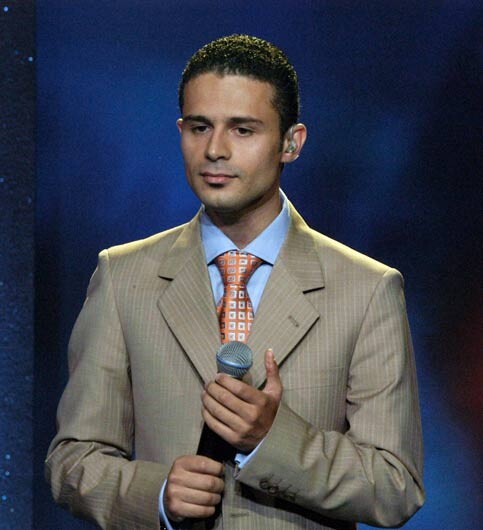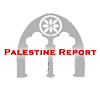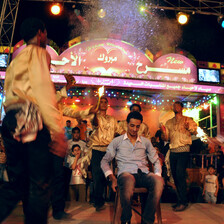Palestine Report 26 August 2004

Original Caption: An undated file picture shows Palestinian singer Ammar Hasan during the taping of an episode of the Arabic version of TV program “Super Star” produced by Lebanon’s Future channel in Beirut. His portraits line walls alongside the “martyrs” killed by Israeli forces but reverence for Ammar Hassan stems not from his exploits in the Palestinian uprising, but for his voice which could propel him to victory this weekend in a hugely popular television talent show. Hassan, orginally from the West Bank village of Salfit but now living in Dubai, has given the Palestinian people a much-welcome respite from the daily grind of life in the occupied territories. (AFP/Getty Images)
Who will be crowned, Ammar or Ayman? This week, the Arab world is in a voting frenzy as the millions of viewers of Future satellite channel’s Superstar II register their preference for the Arab singer of the year, online or by phone.
But the contest, intended to mimic the reality television shows that dominate American airwaves today, holds a twisted mirror to the conflicts that both strain and unite this region. Even though the emphasis on a well-tuned voice makes Superstar II true to the Arabic musical tradition, its political undertones provide grist and tension, feeding the voyeurism on which “reality” programming thrives.
On August 15, when thousands of hopefuls had been whittled down to Syrian Hadi Aswad, Palestinian Ammar Hassan, and Libyan Ayman Alaatar, hostess Rania asked Hassan in front of a live audience what had piqued him about a judge’s comment. Apparently Lebanese judge Fadia al-Haj had complained that Hassan’s dramatic rendition of Fayrouz’s “Jerusalem” and other Arab anthems played too much on audience heartstrings.
“First, I am so grateful for all the help that they have given us,” Hassan had replied calmly. “Because in the end, this is improving our skill. “And,” he added, “we all love to laugh, but in the end, she has to understand that [Palestinians] are my people, and this is what I feel.”
It was an answer that received a rousing response from the Beirut audience, and cheers back at home.
But Hassan’s rise into the spotlight of such culturally contested ground has been met with chagrin in some quarters. By and large the spate of new reality programming - first last year’s Superstar, then Star Academy in which untried talents live and train together in the arts only to be gradually eliminated by the audience, then even more Western copycats - are controversial. In a community where private matters are handled by the family and the proper boundaries between men and women is a political minefield, these shows are provocative. Further, they mark a new cultural imprint in an era when millions of American money is being spent to influence regional public opinion.
“So much money is spent on something so ridiculous,” remarks academic counselor Jamileh Abed. “I imagine they are spending millions, money that could be used to build schools in any Arab country.” Abed works with Palestinian students before and after they are educated in the United States, but she refers to Superstar as a cultural invasion not an exchange. “The promoters are Lipton and Nescafe. I don’t imagine they are really interested in promoting Eastern culture art and music. It’s not completely honorable, what they are doing.”
While reality programming was the source of much Palestinian parlor discussion when the genre first hit Arab satellite television, critics didn’t get into the pulpit until Ammar Hassan made his way into the final rounds of Superstar. When Hassan became one of the 12 finalists, a Ramallah sheikh listed the distraction of satellite television among the ills plaguing the Palestinian cause. Hamas officials were more blunt, saying in a statement, “Our people are in need of heroes, resistance fighters and contributors to building the country and are not in need of singers, corruption mongers and advocates of immorality.”
In Iraq, one reality television program managed to dodge these minefields. Labor and Materials was created to play directly to the obvious audience: Baghdad’s troubled homeowners. In 15-minute segments, host Shaima Emad Zubair and her crew carry in new furnishings and erect walls, replace shattered glass and lay down plush carpets to Iraqi homes that have been demolished in the ongoing fighting. The renovation is funded by private donors. “I like the program,” a makeover recipient told the Christian Science Monitor, “because it expresses the suffering of Iraqis without making it pretty. It shows the reality.”
With Superstar II, however, it’s as if life and art must compete. On August 29, when Hassan will learn whether he has been elected top pop idol, thousands of Palestinian prisoners in Israeli jails will likely be entering their 15th day of a hunger strike protesting their conditions. The prisoners are striking against a range of abuses, including arbitrary searches, beatings, lack of visitation rights and standards of medical care.
At press time, some striking prisoners had been moved to field hospitals, reported the Prisoner’s Society. There is a real danger that if the protest is prolonged, fatalities could result.
Hassan has tried to diplomatically honor the prisoners, while steering clear of a political minefield that could sabotage his support in the Arab world. “Most of my votes are coming from Abu Dhabi,” he told the Israeli newspaper Haaretz. It is not only show judge Al-Haj who might protest an overt political show. In Kuwait, Palestinians were expelled after PLO support for Iraq; in Lebanon, sectarian violence tore the country apart; in Jordan, a massive crackdown on the PLO resulted in the violence of Black September; in Egypt, where the first peace treaty with Israel was signed, relations have since been strained. Nowhere in the Arab world where Hassan must win hearts and minds is the Palestinian problem without controversy.
Equally, to downplay the politics of his rise to the top is to aggravate detractors. Hassan, in his short time in the spotlight, has drawn more international media coverage than the prisoners have attracted in their massive show of political will. The headline of a Jerusalem Post story, “Palestinian teenyboppers pine for change,” echoed the tenor of nearly every article written about the new-christened pop hero. Observers inevitably see the outpouring of support for Hassan as a lightening of the mood and a turning from the Intifada.
Alongside advertisements for discounted cell phone rates to encourage votes for the local star, Palestinian streets are plastered with a new poster. “Registration is a condition for voting,” read the understated yellow signs. President Yasser Arafat has finally set a date for registering voters in the elections. Three thousand people have been trained to staff over 1,000 registration offices all over the West Bank and Gaza. The registration drive will begin on September 4 and is scheduled to run for one month. Hamas, long holding the official political process at arms length, has said that it, too, will participate. Still, without a firm date for elections and the backing of the international community, even elections officials acknowledge that updating the voter rolls may be in vain. Reminiscent of a long run to the finish, the hold music at the elections commission is the soundtrack to Chariots of Fire.
Even the beleaguered Arafat has paid homage to Hassan and his family. In a telephone call, the elected Palestinian leader reportedly told Hassan, “You are a Palestinian struggler of a different type and we are proud of you.” The singer himself speaks of his art as a form of resistance.
Nevertheless, on the Sunday night of Hassan’s final performance, Ramallah’s streets were on fire after (false) rumors that hunger-striking prisoners had died. Young men, reportedly led by Birzeit University students, made the rounds to every local venue featuring a television set and ejected patrons into the street.
At the Kasaba Theater, which was showing the political film Route 181, the movie was interrupted by chanting and then the shouted order to “Get up!” According to Kasaba owner Khaled Alayan, the group of 40 odd young men and boys apologized when they realized that the film was no fun flick, but the audience had already departed for home, blinking in the smoke of burning tires outside. “Hooligans,” a taxi driver called them.
Whatever reality Palestinians see reflected in Hassan, however, there is no disguising the pride many take in his success. The Palestinian cellular company is offering discounted calls not only because Hassan is Palestine’s own, says a spokesperson. “It is because he has a strong voice. There were Palestinians who participated in Superstar before, but we never lowered our rates for them. Ammar is just a really good singer.”
Hassan was raised in the village of Salfit and studied music at Nablus’ Al Najah University. He sang in the university choir and had the chance to tour Europe and other Arab states. Five years ago, he moved to the United Arab Emirates to pursue his career; the worsening Palestinian political climate had little room for singers. Meanwhile, the village of 12,000 he left behind is increasingly encroached on by the Jewish settlement of Ariel. In May this year, the Israeli military confiscated 360 dunams from the town for the construction of the northern stretch of the wall Israel is building through the West Bank. Thirty-eight of the town’s citizens are in Israeli jails and currently on strike. Still, the municipality has set up 25 computers for public voting this week, and several thousand people reportedly watched the singer on a large-screen television provided by local government officials.
In the tradition of all the great Arab singers - Um Kulthum, Abdel Halim Hafez, Abdel Wahab, and of course Fayrouz - Hassan has been complimented on a voice that roundly and easily carries the eastern musical scale and its rhythms. Despite the fact that you are Palestinian, one of the Superstar II judges seemed to say, you are here because your voice is really impeccable.
Thus, Superstar II clings to Arab tradition as much as it flies in its face. In spite of the popularity of dancing, hip-shaking video artists like Nancy Ajram and Haifa Wahbe on Arab satellite channels, Hassan puts together few fancy moves. And without the easy congeniality of his competitor Alaatar, Hassan must truly rely on his voice to carry him through the elections process that will eventually crown him or weed him out.






